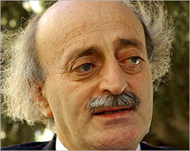Lebanon opposition unfazed by blasts
Armed with an election victory, Lebanon’s anti-Syrian coalition has pressed ahead with its efforts to form the government, undaunted by the car bombings that killed two Damascus critics this month.

Former Communist Party leader George Hawi, a 67-year-old critic of Syrian influence in Lebanon, was killed by explosives placed under his car seat that detonated as he was driven in Beirut on Tuesday.
On 2 June, anti-Syrian journalist Samir Kassir was killed in the same way.
With the Syrian army’s withdrawal and elections that wrested control of the legislature from Damascus‘ allies, the new entrants want President Emile Lahoud to resign.
Lahoud, a staunch Syrian supporter, is accused of leading the Lebanese security services that, along with Syrian agents, many blame for the murders.
Denial
Lahoud rejects that claim, and Damascus denies it is behind the killings. “The opposition will respond politically,” said Marwan Hamadeh, a senior member of the coalition who was targeted in a car bombing in October.
He survived with serious injuries but his driver was killed.
“We do not use weapons and those means by which we are being targeted. We will respond by forming a majority government,” he said on LBC television.
Aljazeera’s correspondent in Beirut reported Hamadeh as confirming the existence of a hit list of anti-Syrian Lebanese politicians.
Hamadeh said Lebanese sources and sources from inside Syria have confirmed its existence. “There are lists circulated in this country for those designated for being killed. This has been confirmed by foreign sources that nobody could ignore,” he said.
The opposition leader said the anti-Syrian groups, which together won a 72-seat majority in the 128-member legislature, will seek to broaden their alliances and to bring back to its ranks Michel Aoun, who broke away and ran his own election campaign, and other factions.
|
“We do not use weapons and those means by which we are being targeted. We will respond by forming a majority government” |
Former general Aoun and his allies have 21 seats in the new legislature while Amal and Hizb Allah groups together clinched 35 seats in the 29 May–19 June elections.
Parliament was expected to hold its first session on Tuesday to elect a speaker and then get down to the business of nominating a premier who will form a Cabinet.
Vote of confidence
Then the Cabinet will seek a vote of confidence from Parliament.
Prime Minister Najib Mikati, named in April to lead the country through elections, resigned on Tuesday after the new Parliament began its mandate.
He has said he’s willing to serve again if he has the support of the legislature.
Another main candidate for the post is Saad al-Hariri, son of former premier Rafiq al-Hariri.
The political novice is one of the top leaders of the winning coalition and his own bloc within the alliance is the biggest in parliament, with 36 seats.
Saad al-Hariri has not committed to whether he would seek the premiership, opting to consult with allies before deciding.
Both Mikati and Saad al-Hariri are Sunni Muslims, the group to whom the job is allotted to in Lebanon‘s sectarian-based political system that gives the position of speaker of Parliament to the Shia Muslims and the presidency to Maronite Catholic Christians.
Call for strike
 |
|
Walid Jumblatt has called for |
Coalition members have issued a public call for “the highest possible turnout” for Hawi’s funeral on Friday and a general strike for that day.
Opposition leader Walid Jumblatt also called for Lahoud’s removal and a purge of security agencies. “We cannot have a semi-change with half measures. Either we have a full change or we don’t,” he said.
Aoun warned against drawing conclusions ahead of the investigation into Hawi’s killing, adding that Lebanon has become defenceless. “Not every time a person is hit, Baabda is to be blamed,” he said, referring to the presidential palace. “Lebanon has become exposed to the whole world.”
Hawi was a voice of militant communism in the early days of the 1975-90 civil war and a strong ally of Syria and a leader of anti-Israeli fighters during the 1980s. But he became in recent years an outspoken critic of Syrian influence.